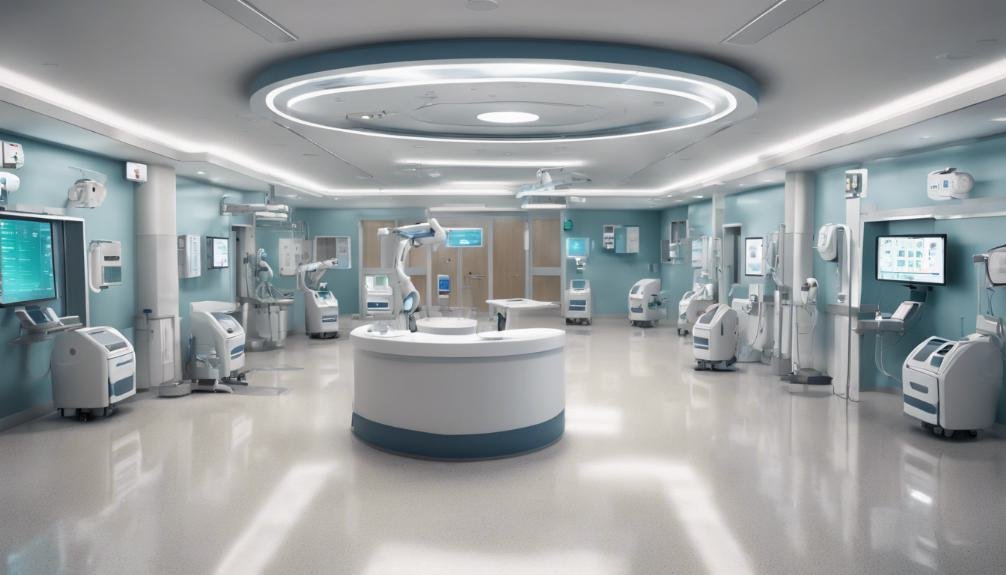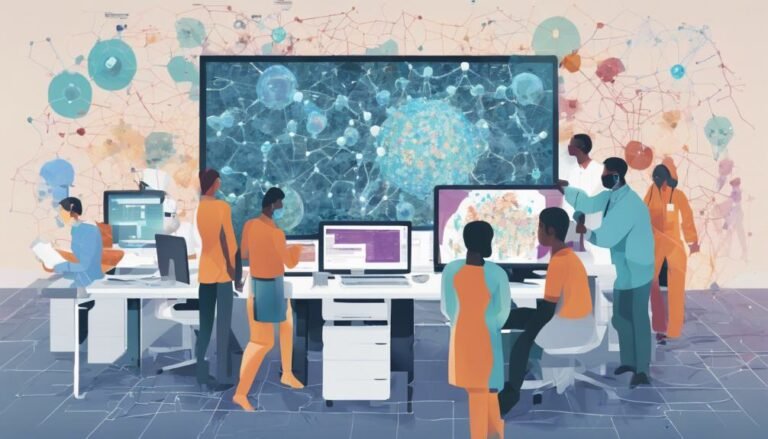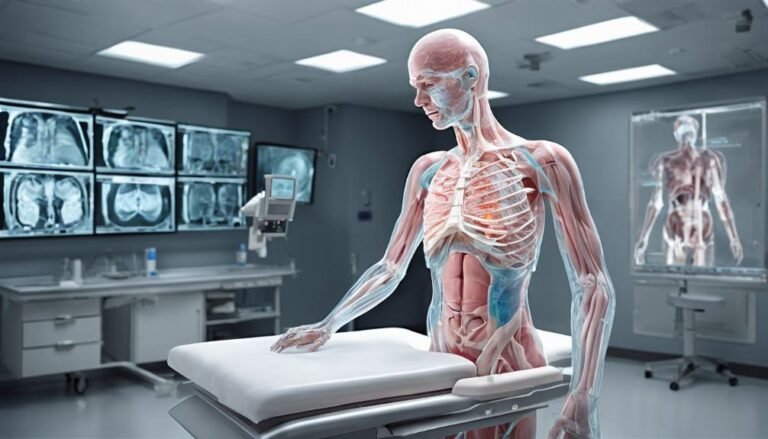AI for Hospital Management
Did you know that AI is transforming hospital management by revolutionizing decision-making processes and improving patient care outcomes? Imagine a system that optimizes patient flow, streamlines administrative tasks, and enhances diagnostic accuracy—all while ensuring cost-effectiveness and data security. With AI automating inventory management, improving cost efficiency, and enhancing staff scheduling, hospitals are leveraging technology to make informed decisions and streamline operations effectively. The benefits are vast, but the impact on patient care and operational efficiency is truly remarkable.
Key Takeaways
- AI enhances decision-making with real-time data analysis.
- Optimizes patient flow and resource allocation for efficiency.
- Streamlines administrative tasks through automation and predictive analytics.
- Improves operational efficiency with AI technologies and staff training.
- Enhances diagnostic accuracy and proactive interventions for personalized care.
Enhancing Decision-Making Processes
By implementing AI technologies in hospital management systems, decision-making processes can be greatly enhanced through real-time data analysis and predictive analytics. Ethical considerations must be at the forefront of AI implementation in healthcare to guarantee patient privacy and data security. Hospitals need to prioritize staff training to effectively integrate AI tools into their daily operations. Training programs should cover not only the technical aspects of using AI systems but also the ethical implications and thorough practices for handling sensitive patient information.
When incorporating AI into decision-making processes, hospitals must consider the potential biases that may exist within the algorithms. Regular audits and reviews of AI systems are essential to identify and rectify any biases that could impact patient care. Staff members should be trained to interpret AI-generated insights accurately and use them to make informed decisions that benefit both patients and the healthcare facility.
Optimizing Patient Flow
Integrating AI technologies in hospital management systems can greatly optimize patient flow within healthcare facilities, resulting in enhanced efficiency and better patient outcomes. By leveraging AI algorithms to analyze data and predict patient demand, hospitals can streamline operational flow, ensuring resources are allocated efficiently. This optimization leads to reduced wait times, improved patient satisfaction, and enhanced overall patient experience.
AI can assist in predicting patient admissions, enabling staff to adjust schedules and allocate resources accordingly. Additionally, AI-powered systems can optimize bed management, ensuring that patients are assigned to the most appropriate beds promptly. This proactive approach minimizes bottlenecks, enhances operational efficiency, and ultimately leads to a smoother patient flow throughout the facility.
Streamlining Administrative Tasks
Utilizing AI technologies in hospital management systems can streamline administrative tasks, optimizing efficiency and enhancing overall operational performance. When it comes to staff training, AI can assist in automating the onboarding process for new employees, ensuring they're quickly integrated into the hospital's administrative workflows.
By utilizing AI-powered virtual assistants, staff members can access real-time information and guidance, reducing the time spent on administrative tasks like scheduling, data entry, and document management.
Workflow optimization is another key area where AI can make a significant impact. AI systems can analyze administrative processes, identify bottlenecks, and suggest improvements to streamline workflows. For example, AI algorithms can predict patient admission rates, allowing administrators to allocate resources efficiently and adjust staffing levels accordingly.
Improving Operational Efficiency
To enhance hospital management operations, optimizing operational efficiency is key in leveraging AI technologies effectively.
Staff training plays an important role in making sure that employees are proficient in using AI tools to streamline tasks and improve overall efficiency. Providing thorough training programs can empower staff to utilize AI solutions to their full potential, leading to smoother workflows and better patient care.
Moreover, equipment maintenance is another essential aspect to take into account when aiming to enhance operational efficiency in hospitals. AI can be utilized to predict when equipment maintenance is needed, preventing unexpected breakdowns and minimizing downtime.
Enhancing Diagnostic Accuracy
AI plays a pivotal role in enhancing diagnostic accuracy within hospital management. By utilizing AI in imaging analysis, hospitals can achieve more precise and efficient diagnosis of medical conditions.
Additionally, the application of AI in precision medicine and predictive analytics offers significant benefits in tailoring treatments and predicting patient outcomes.
AI in Imaging Analysis
With advancements in technology, the integration of artificial intelligence into imaging analysis has significantly enhanced diagnostic accuracy in hospital management. AI plays a pivotal role in pathology analysis by enabling automated reporting, which speeds up the process and reduces the chances of human error.
Machine learning algorithms are transforming radiology by improving image interpretation accuracy. These algorithms can analyze vast amounts of data to detect patterns that might be overlooked by human eyes, leading to more precise diagnoses.
In addition, AI in imaging analysis helps in the early detection of diseases, allowing for timely intervention and treatment planning. By streamlining the analysis process and providing detailed insights, AI contributes to better patient outcomes and overall healthcare efficiency.
As AI continues to evolve, its impact on imaging analysis is expected to revolutionize diagnostic practices in hospitals, making them more accurate and effective.
Precision Medicine Applications
Advancements in technology have paved the way for the application of precision medicine in hospital management, particularly in enhancing diagnostic accuracy. Precision medicine utilizes genetic testing to tailor medical treatments to individual patients, ensuring more effective outcomes.
By analyzing a patient's genetic makeup, healthcare providers can identify specific biomarkers that influence how a person responds to certain medications. This personalized approach helps in predicting drug interactions, minimizing adverse effects, and optimizing treatment efficacy.
Genetic testing plays a pivotal role in identifying genetic variations that may impact drug metabolism, absorption, and efficacy. Understanding these genetic factors can prevent potential drug interactions, adverse reactions, and treatment failures.
Incorporating genetic testing into diagnostic processes allows healthcare professionals to make data-driven decisions, providing patients with personalized treatment plans based on their unique genetic profiles.
Predictive Analytics Benefits
Utilizing predictive analytics in hospital management greatly enhances diagnostic accuracy by leveraging data insights to anticipate patient outcomes and tailor treatment plans accordingly. Predictive analytics can play a pivotal role in predicting readmission rates, allowing healthcare providers to intervene proactively and implement preventive measures.
By analyzing historical data and identifying patterns, hospitals can better allocate resources, ensuring that patients receive timely and appropriate care. This optimization of resource allocation not only improves patient outcomes but also helps in reducing hospital costs by minimizing unnecessary procedures or hospital stays.
Moreover, predictive analytics aids in optimizing treatment plans by personalizing interventions based on individual patient characteristics and predicted responses. This personalized approach enhances the effectiveness of treatments, leading to better outcomes and higher patient satisfaction.
Personalizing Patient Care
Tailoring medical treatments to individual patients is a key aspect of enhancing the quality of care provided in hospitals. Patient engagement plays an important role in this process as it allows healthcare providers to create personalized treatment plans that cater to each patient's unique needs.
By leveraging AI technologies, hospitals can now implement remote monitoring systems that enable continuous tracking of patient health metrics. This remote monitoring facilitates proactive interventions, where healthcare professionals can promptly address any deviations from the patient's baseline health status.
Personalizing patient care through AI-driven solutions not only improves patient outcomes but also enhances overall patient satisfaction. These personalized treatment plans consider factors such as medical history, genetic predispositions, lifestyle choices, and real-time health data.
By analyzing this information, AI algorithms can recommend customized interventions that optimize treatment effectiveness. Additionally, remote monitoring ensures that healthcare providers can closely monitor patient progress and intervene promptly if any issues arise.
Ultimately, the integration of patient engagement, personalized treatment plans, remote monitoring, and proactive interventions through AI technologies heralds a new era of individualized healthcare delivery within hospital settings.
Enhancing Staff Scheduling
You can enhance staff scheduling by utilizing AI algorithms to determine the most suitable shift assignments based on factors like workload and staff availability.
This approach allows for real-time resource allocation, ensuring that the right personnel are in place to meet the demands of patient care.
Optimal Shift Assignments
Efficient hospital management relies heavily on optimizing shift assignments to enhance staff scheduling and guarantee ideal coverage. By carefully considering staff retention and workload distribution, hospitals can create balanced schedules that meet both employee needs and operational demands.
To improve staff retention, it's vital to create schedules that take into account individual preferences and work-life balance. Utilizing AI algorithms can help analyze historical data on shift preferences and performance to tailor assignments to each staff member, boosting job satisfaction and reducing turnover rates.
Workload distribution is another critical factor in creating ideal shift assignments. By leveraging AI technology, hospitals can efficiently distribute workloads among staff members based on their skills, experience, and availability. This ensures that no one is overburdened while maintaining high-quality patient care.
Real-Time Resource Allocation
Utilizing real-time data analytics in hospital management enhances staff scheduling by dynamically allocating resources based on current demand and staff availability. By integrating real-time bed availability information into the scheduling process, hospitals can optimize staffing levels to meet patient needs efficiently.
Real-time bed availability data allows managers to adjust staffing in response to fluctuations in patient admissions and discharges, ensuring that resources are allocated where they're most needed. This dynamic approach to scheduling can help reduce wait times, improve patient outcomes, and enhance overall operational efficiency.
Additionally, incorporating resource utilization planning into staff scheduling enables hospitals to make the most effective use of their workforce. By analyzing historical data on patient flow and resource usage, AI systems can predict future demand and allocate staff accordingly, minimizing overstaffing during low-demand periods and preventing understaffing during peak times.
Automating Inventory Management
Implementing artificial intelligence systems in hospital management can greatly enhance the efficiency and accuracy of inventory management processes. AI can revolutionize the way hospitals handle their supply chain by automating inventory tracking. By utilizing AI-powered tools, hospitals can monitor inventory levels in real-time, predict demand more accurately, and streamline the procurement process.
AI algorithms can analyze historical data, current usage rates, and other relevant factors to optimize inventory levels and prevent stockouts or excess stock. This proactive approach guarantees that essential medical supplies are always available when needed, reducing the risk of disruptions in patient care.
Moreover, AI can identify trends and patterns in inventory management, enabling hospitals to make data-driven decisions to improve overall efficiency and cost-effectiveness.
Automating inventory management through AI not only saves time and reduces human error but also enhances the hospital's ability to respond swiftly to changes in demand or supply chain disruptions. By embracing AI technology in inventory management, hospitals can operate more effectively and ensure that resources are utilized efficiently to provide the best possible patient care.
Improving Cost Management
By harnessing the power of artificial intelligence, hospitals can greatly improve their cost management strategies. Implementing cost-saving strategies through technology can lead to significant financial benefits. AI can revolutionize financial analysis by providing real-time insights into expenses, revenue streams, and resource allocation.
One key area where AI can make a difference is in budget optimization. Through advanced algorithms, AI can analyze vast amounts of data to identify areas where costs can be reduced without compromising patient care. This technology can help hospitals streamline operations, negotiate better contracts with suppliers, and forecast future financial needs more accurately.
Moreover, AI can assist in identifying patterns and trends that may not be immediately apparent to human analysts. By leveraging AI for cost management, hospitals can make informed decisions that drive efficiency and improve overall financial health. The implementation of AI in cost management isn't just a technological advancement but a strategic move towards sustainable and optimized financial performance.
Enhancing Data Security
You must prioritize the security of patient information in hospital management by implementing robust data protection measures.
Preventing data breaches is vital to maintaining patient trust and safeguarding sensitive medical records.
Guarantee strict compliance with regulations such as HIPAA to uphold the confidentiality and integrity of healthcare data.
Secure Patient Information
Improving data security for patient information in hospitals is essential in safeguarding sensitive medical records and ensuring patient confidentiality. One important way to enhance data security is through data encryption. By utilizing strong encryption algorithms, hospitals can protect patient information from unauthorized access and maintain its confidentiality.
Implementing access control measures is equally significant in securing patient data. Hospitals can restrict access to sensitive information by using role-based access control systems, ensuring that only authorized personnel can view or modify patient records.
Data encryption plays an important role in securing patient information by encoding data in a way that only authorized individuals with the decryption key can access it. This method adds an extra layer of protection against potential breaches or data leaks.
Access control mechanisms further strengthen data security by regulating who can interact with patient records, minimizing the risk of unauthorized access.
Prevent Data Breaches
Improving data security measures is essential for preventing data breaches in hospital management. Implementing data encryption is pivotal to safeguard sensitive patient information from unauthorized access. By encrypting data at rest and in transit, hospitals can guarantee that even if a breach occurs, the stolen data remains unreadable and unusable.
Access control plays an important role in preventing data breaches by limiting the access rights of individuals within the hospital network. By setting up role-based access controls and regularly reviewing and updating user permissions, hospitals can minimize the risk of unauthorized users gaining entry to confidential information.
In addition to data encryption and access control, hospitals must invest in robust cybersecurity measures and data loss prevention technologies. Regularly updating security protocols, conducting vulnerability assessments, and monitoring network activities can help identify and mitigate potential threats before they result in data breaches.
Ensure Compliance With Regulations
Enhancing data security in hospital management involves ensuring compliance with regulations to protect sensitive patient information effectively. Compliance monitoring plays a vital role in this process, ensuring that healthcare facilities adhere to regulatory requirements and standards.
By implementing AI audits, hospitals can automate the monitoring of their compliance efforts, identifying any potential gaps or areas of improvement in real-time.
Regulatory adherence is essential in safeguarding patient data and maintaining trust within the healthcare system. Automated reporting tools provided by AI systems can streamline the process of documenting compliance activities, making it easier for hospital management to track and demonstrate their adherence to regulations.
These tools can generate detailed reports, flagging any non-compliance issues for immediate action.
Conclusion
As you reflect on the potential of AI in hospital management, consider the endless possibilities for improving patient care, operational efficiency, and cost-effectiveness.
The future of healthcare lies in the hands of artificial intelligence, with its ability to revolutionize decision-making processes and streamline operations effectively.
Stay tuned for more advancements in AI technology that will continue to transform the way hospitals operate and deliver care.
The possibilities are endless, and the impact is bound to be revolutionary.







